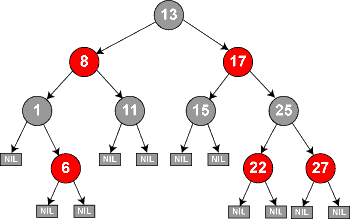如何将 Linux 内核实现的红黑树 rbtree 运用到你的 C 程序中?
相信大家都知道红黑树是什么吧,但是呢......如果你确实不知道,你不该穿越到这儿的,你应该去这里,这里,还有这里看看,然后再来这里看看,最后如果大爷您赏脸,再来看看我吧 :-)
废话少说,直接入正题吧,Linux 内核为我们实现了简洁高效但是......却不那么容易使用的红黑树,如何在你的 C 程序里面使用内核开发者为我们实现的红黑树呢,别急别急,本文将一一为您呈现。
Linux 内核红黑树的实现代码位于:lib/rbtree.c,同时头文件在 include/linux/rbtree.h 中,内核中很多模块都使用了红黑树,详细介绍参见内核文档 Documentation/rbtree.txt。
内核中红黑树定义如下:
struct rb_node
{
unsigned long rb_parent_color;#define RB_RED 0#define RB_BLACK 1
struct rb_node *rb_right;
struct rb_node *rb_left;
} __attribute__((aligned(sizeof(long))));
struct rb_root
{
struct rb_node *rb_node;
};
在内核的红黑树时,需将struct rb_node 结构包含在自己的数据结构中,比如:
struct mynode {
struct rb_node node;
char *string;
/*more stuff of your structure hereby*/
};
可以通过container_of宏获取包含了 rb_node 结构的起始地址,也可以通过rb_entry(node, type, member),其实:
#define rb_entry(ptr, type, member) container_of(ptr, type, member)
container_of 中使用了offsetof宏,它们都是内核中常见的宏,其定义如下:
#if defined(container_of)
#undef container_of
#define container_of(ptr, type, member) ({ \
const typeof( ((type *)0)->member ) *__mptr = (ptr); \
(type *)( (char *)__mptr - offsetof(type,member) );})
#endif
#if defined(offsetof)
#undef offsetof
#define offsetof(TYPE, MEMBER) ((size_t) &((TYPE *)0)->MEMBER)
#endif
如果对上面两个宏的意思不理解,可以在本文后面留言 :-)
为了使用内核提供的红黑树,你需要自己实现插入和查找函数,如下:
struct mynode *my_search(struct rb_root *root, char *string)
{
struct rb_node *node = root->rb_node;
while (node) {
struct mynode *data = container_of(node, struct mynode, node);
int result;
result = strcmp(string, data->string);
if (result < 0)
node = node->rb_left;
else if (result > 0)
node = node->rb_right;
else
return data;
}
return NULL;
}
int my_insert(struct rb_root *root, struct mynode *data)
{
struct rb_node **new = &(root->rb_node), *parent = NULL;
/* Figure out where to put new node */
while (*new) {
struct mynode *this = container_of(*new, struct mynode, node);
int result = strcmp(data->string, this->string);
parent = *new;
if (result < 0)
new = &((*new)->rb_left);
else if (result > 0)
new = &((*new)->rb_right);
else
return 0;
}
/* Add new node and rebalance tree. */
rb_link_node(&data->node, parent, new);
rb_insert_color(&data->node, root);
return 1;
}
释放某一节点空间:
void my_free(struct mynode *node)
{
if (node != NULL) {
if (node->string != NULL) {
free(node->string);
node->string = NULL;
}
free(node);
node = NULL;
}
}
综合上面的代码:
#define NUM_NODES 32
int main()
{
struct mynode *mn[NUM_NODES];
/* *insert */
int i = 0;
for (; i < NUM_NODES; i++) {
mn[i] = (struct mynode *)malloc(sizeof(struct mynode));
mn[i]->string = (char *)malloc(sizeof(char) * 4);
sprintf(mn[i]->string, "%d", i);
my_insert(&mytree, mn[i]);
}
/* *search */
struct rb_node *node;
for (node = rb_first(&mytree); node; node = rb_next(node))
printf("key = %s\n", rb_entry(node, struct mynode, node)->string);
/* *delete */
printf("delete node 20: \n");
struct mynode *data = my_search(&mytree, "20");
if (data) {
rb_erase(&data->node, &mytree);
my_free(data);
}
/* *delete again*/
printf("delete node 10: \n");
data = my_search(&mytree, "10");
if (data) {
rb_erase(&data->node, &mytree);
my_free(data);
}
/* *delete once again*/
printf("delete node 15: \n");
data = my_search(&mytree, "15");
if (data) {
rb_erase(&data->node, &mytree);
my_free(data);
}
/* *search again*/
printf("search again:\n");
for (node = rb_first(&mytree); node; node = rb_next(node))
printf("key = %s\n", rb_entry(node, struct mynode, node)->string);
return 0;
}
完整代码请移步我的github:https://github.com/forhappy/rbtree
